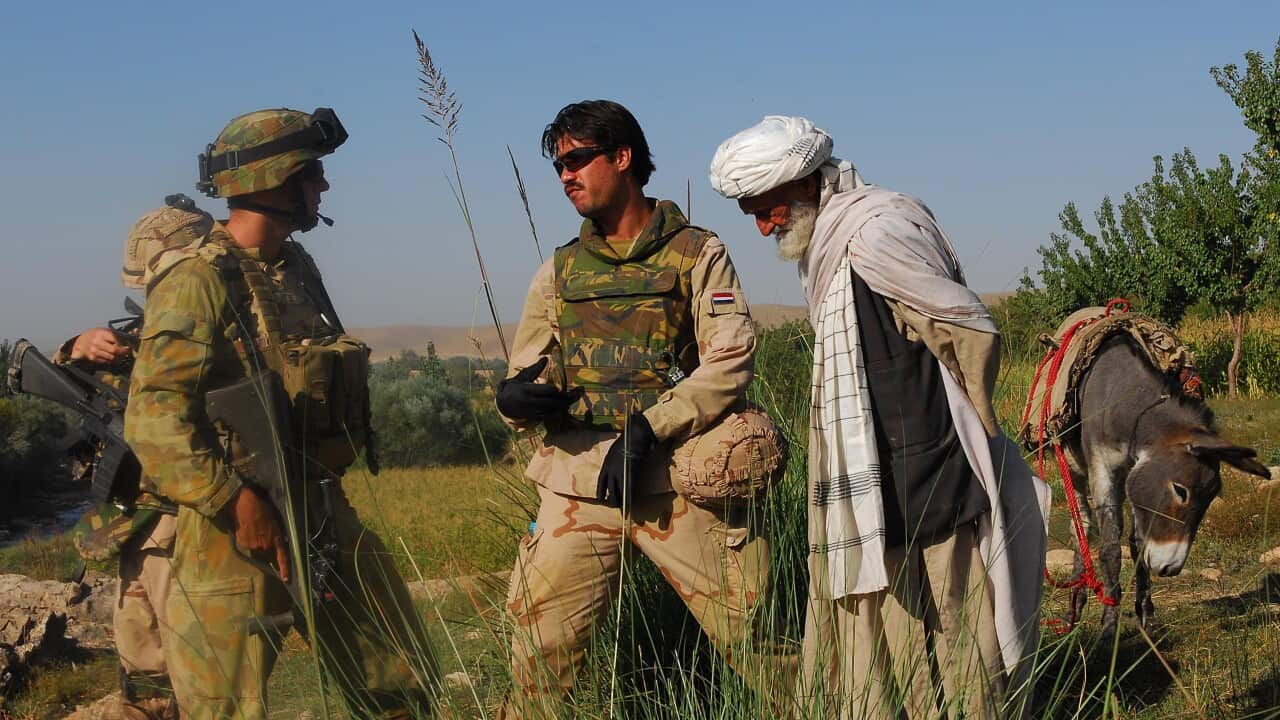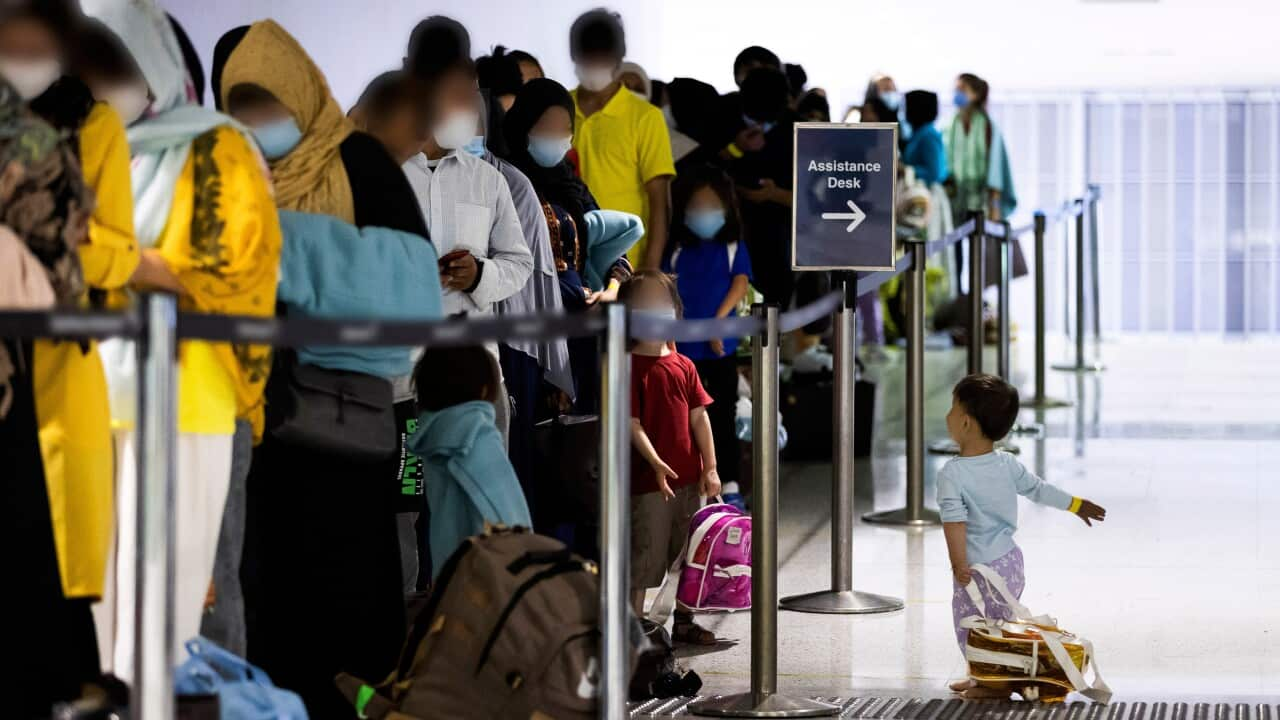Key Points
- The federal government announced on Thursday, 1 June, that it would terminate the LEE program from 31 May, 2024.
- After the government's recent decision, Afghan interpreters are extremely concerned about their futures.
- Some Afghan interpreters believe that it's an "unfair and devastating decision".
Ahmad* worked alongside Australian forces in Kandahar and Uruzgan between 2010 and 2011. Despite lodging his application for interpreters' certification in 2017 and receiving approval from the Department of Defence in March 2022, he said he was still waiting for an Australian visa to be granted by the Department of Home Affairs.
Ahmad* said that when he heard about the scrapping of the LEE program, it magnified his “worries and concerns” about his future in Afghanistan.
The federal government announced on Thursday, 1 June, that
That move was recommended by an independent review of the program, which found neither the Departments of Foreign Affairs and Trade nor Defence had "adequate case management systems in place".
“My personal concern is that if they (Afghan locally engaged employees) stay here [in Afghanistan], they will never be able to work in the government or private sector. Also, if they identified that they worked with Australians or NATO, then they could be punished further,” he said.
“Prior to the fall of Afghanistan, I had less fear because they (the Taliban) were not controlling the cities and they could not threaten people directly… but, unfortunately, now they are controlling the whole country and they can do whatever they want to.
“I have two daughters and two sons. They often ask me what will happen to our future, when will we be able to freely go outside, play with other kids and study. When I think about the future of my children, it bothers me.”

Afghan National Security Forces (ANSF) partnered with Australian Special Forces Source: AAP / AAP/Dept of Defence
“We [interpreters] worked with Australians in a very difficult time here in Afghanistan. Some even called us spies and national traitors but we accepted everything," he said.
Unfortunately, the Australian government has forgotten us.Ahmad*
“Before they [Australian government] scrap this process or close the doors to those who worked with Australians in Afghanistan, it is necessary to save the lives of the people who remain in Afghanistan and open the doors for their new lives [in Australia].”
‘Save our lives’
Ali* worked as an interpreter with Australian forces in Uruzgan province between 2009 and 2012. He said he lodged his application for certification in August 2021, but still hasn’t received any update from the Department of Defence.
He said he found the recent announcement by the government disheartening and since the Taliban had entered the cities, that the lives of people had changed, especially for those who worked alongside foreign forces in Afghanistan.
“Now we are living under severe psychological stress and death threats," he said.
We sleep with fear, wake up with fear and we do not know whether we will be alive in the next one hour or not.Ali*
“In the first days when the changes came, we could not leave the house and, since then, we have changed our home address three times.”
Ali* said he believed that it would have been better if the Australian government had first “process(ed) the (existing) applications” and “respond(ed)” to the applicants before it made the announcement.
“Not only (are) their [interpreters’] lives (at risk) but (also) their families and children's (as well). We are not having a good time here [in Afghanistan],” he said.
“As the situation (in) Afghanistan is getting worse day by day, and the Taliban are searching houses, I kindly request from the Australian government and the Ministry of Defence to save our lives.”

Afghan former interpreters for the US and NATO forces gather during a demonstration in downtown Kabul on 30 April, 2021. Source: AFP
‘Visas had expired’
Khalid* is one the nearly 1,400 Afghans who was granted an emergency visa in 2021 to leave Afghanistan but he never made it to Australia, as it expired within three months.
Khalid* worked alongside Australian forces in 2011 for nearly one year and lodged his application for an Australian visa in 2012.
“When the [Afghan] government collapsed in August 2021, I received a temporary subclass 449 visa for evacuation (but) didn’t get a permanent visa,” he said.
“We were told to remain in a safe place, to ensure our safety and wait until [the Australian government] could prepare an evacuation flight for us and our families from Kabul airport. Unfortunately, no flights were available at that time and our visas had expired.”

Credit: Supplied
Ahmad* said he received an email from the LEE program in March which stated that the members of his family included in the application “are required to complete biometric (screening)” but there wasn’t any locations in Afghanistan where they could get the process done.
Biometric screening involves checking fingerprints, facial recognition and other aspects to determine whether a person had any criminal record.
However, Khalid* said that he and his family were prepared to travel to neighbouring countries to complete the biometric screening and health checks required for an Australian visa.
“We are ready to go to a third country, a close neighbouring country, in order to complete the biometric [process],” he said.
“We have to pay a lot of money to get Pakistan’s visas. So, my request to the Australian government is that they should provide gate passes through the Ministry of Interior of Pakistan for the remaining interpreters instead of visas.”
‘Unfair and devastating decision’
Raz Mohammad is a former interpreter and president of the Afghan National Association of Australia.
He told SBS Pashto that the government's recent decision to scrap the Afghan LEE program was “an unfair and devastating decision for those who were still stuck in Afghanistan”.
“This decision will leave so many people at huge risk who have worked and supported the Australian government’s mission in Afghanistan in the last 20 years,” he said.
A federal government statement released on 1 June said the Government was committed to supporting Afghans and had allocated 26,500 dedicated places in Australia’s Humanitarian Program for Afghan nationals through to 2025-26.
“Since the fall of Kabul, more than 12,000 permanent humanitarian visas have been granted to Afghan citizens under the Humanitarian Program, and the Department of Home Affairs continues to prioritise Humanitarian visa applications from Afghan LEE and their immediate family members,” the statement said.
“Since 2013, more than 2,500 Afghan LEE and their families have arrived in Australia under the Afghan LEE program and have made valuable contributions to the Australian community.”

Credit: Supplied
“Their last hope is to immigrate to Australia to save their lives and their families’ lives but the Australian government has destroyed their last hope by making this cruel decision,” he said.
This decision (goes) against Australian values.Raz Mohammad
Mr Mohammad said that as it wasn’t possible to “process their visas in Afghanistan”, the Australian government could negotiate with Afghanistan’s neighbours to evacuate applicants to a third country.
“(The) Australian government (could) speak with (the) Tajikistan and Uzbekistan governments to allow these people in(to) their territories without passports, then (the) Australian government (could) process their cases there and issue them ImmiCards (official travel documents) to bring them to Australia,” he said
“The Australian government and Australian people must remember that these people have risked much, including their lives, to support the Australian mission in Afghanistan and saved so many Australian lives by providing valuable services.
“Spending some money is not more important than the lives of Afghan LEEs.”
*Names changed due to safety concerns



